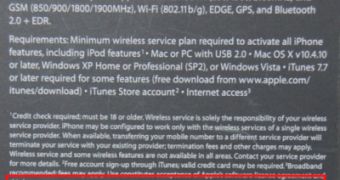A while ago, it was reported that first-generation iPhone owner Jose Trujillo had sued Apple over the iPhone's lack of a user-replaceable battery. The man claimed that, upon purchase, he had not been aware of this aspect, although the company does clarify that a “service provider” is tasked with doing the replacing. The lawsuit has now been dismissed, reports Technorati.
According to District Judge Matthew Kennelly, “Apple disclosed on the outside of the iPhone package that the [battery has] limited recharge cycles and may eventually need to be replaced by [an] Apple service provider." The Judge therefore concluded that, "under the circumstances, no reasonable jury could find that deception occurred." Trujillo was accusing Apple of “consumer fraud” when he filed the suit in an Illinois state court in July 2007.
Apple's end of the story lies not within court filings, but within the company's “Tech Specs” page on iPhone and iPhone 3G.
“After a period of time that will vary depending on use and settings, you may find that your battery will power your device for only a couple of hours, requiring you to charge more frequently,” the company says. “Rechargeable batteries have a limited number of charge cycles and may eventually need to be replaced.”
The company has even set up a whole section on its website dedicated entirely to battery use, optimization, and replacement. Apple also defines “Battery lifespan” as “the total amount of time your battery will last before it must be replaced.” Further on, the company even clarifies that it has to do the replacing.
“Your one-year warranty includes replacement coverage for a defective battery. You can extend your coverage to two years from the date of your iPhone purchase with the AppleCare Protection Plan for iPhone. During the plan’s coverage period, Apple will replace the battery if it drops below 50% of its original capacity.” Apple clearly states. Hence, District Judge Matthew Kennelly ruled “'nough said!”

 14 DAY TRIAL //
14 DAY TRIAL //